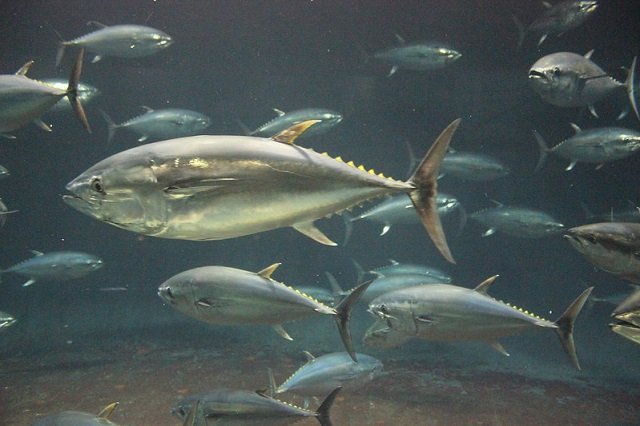by Deakin University
A new study by Deakin University researchers has found that reducing the amount of marine-derived natural resources such as fish meal and fish oil in the diet of farmed Atlantic salmon, will safeguard the future of this rapidly growing aquaculture industry into the next century.

The study, published recently in the prestigious journal Nature Food, outlines how consumer demand for salmon across the globe is driving rapid growth in the Atlantic salmon aquaculture industry, but that future expansion may be determined by how wisely fish meal and fish oil are used in the coming decades.
The research team, from Deakin’s School of Life and Environmental Sciences, used predictive modelling to forecast industry growth based on different dietary formulations in feeds for Atlantic salmon.
They also evaluated the impact this would have on the nutritional value of the fish, particularly on levels of omega-3 fatty acids which are thought to guard against heart attack and stroke, and are also tied to a lower risk of Type 2 Diabetes, macular degeneration and Alzheimer’s disease.
Farmed salmon are fed a combination of land and marine-derived ingredients, including fish oil and fish meal, which are produced from wild caught forage fish such as anchovies.
Incorporating 3 percent fish oil and 3 percent fish meal in aquaculture feeds could permit 2 percent per year production growth until 2100 — independent of novel aquaculture feeds that are currently being utilised.
According to lead researcher, Associate Professor David Francis the modelling presents a positive outlook for sustainable fish production, however, the need remains for ongoing refinement of feed formulations.
“The continued development and adoption of novel raw materials will further decrease the current reliance on finite marine resources – specifically fish oil and fish meal.”
“We envisage that this study will progress the conversation on balancing the development of the aquaculture industry with the conservation of fisheries.”
Stay Always Informed
Join our communities to instantly receive the most important news, reports, and analysis from the aquaculture industry.
Deakin is a leader in aquaculture research and training and will construct a $9.8 million a state-of-the-art aquaculture research innovation centre on the Waurn Ponds campus in 2023.
The $9.8 million Aquaculture and Feed Innovation Hub (AquaFI Hub) includes contributions from the Victorian Higher Education State Investment Fund (VHESIF).
To learn more about Deakin’s AquaFI Hub or discuss partnership opportunities visit here.
Reference
Rocker, M.M., Mock, T.S., Turchini, G.M. et al. The judicious use of finite marine resources can sustain Atlantic salmon (Salmo salar) aquaculture to 2100 and beyond. Nat Food 3, 644–649 (2022). https://doi.org/10.1038/s43016-022-00561-4
Editor at the digital magazine AquaHoy. He holds a degree in Aquaculture Biology from the National University of Santa (UNS) and a Master’s degree in Science and Innovation Management from the Polytechnic University of Valencia, with postgraduate diplomas in Business Innovation and Innovation Management. He possesses extensive experience in the aquaculture and fisheries sector, having led the Fisheries Innovation Unit of the National Program for Innovation in Fisheries and Aquaculture (PNIPA). He has served as a senior consultant in technology watch, an innovation project formulator and advisor, and a lecturer at UNS. He is a member of the Peruvian College of Biologists and was recognized by the World Aquaculture Society (WAS) in 2016 for his contribution to aquaculture.




